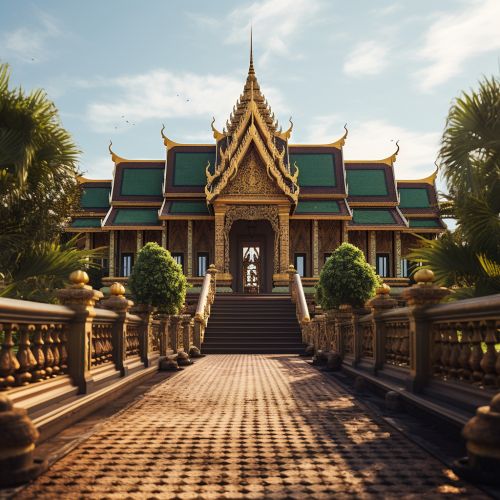Norodom Sihanouk
Early Life
Norodom Sihanouk was born on October 31, 1922, in Phnom Penh, Cambodia. He was the son of Norodom Suramarit and his wife, Sisowath Kossamak. His father was a minor royal figure, while his mother was a daughter of King Sisowath Monivong, making Sihanouk a royal by birth.
Ascension to the Throne
In 1941, after the death of his grandfather, King Sisowath Monivong, Sihanouk was selected by the French authorities to succeed him. This decision was made due to Sihanouk's youth and malleability, as the French believed he would be easier to control than other potential candidates.


Reign and Political Career
Sihanouk's reign was marked by a struggle for Cambodia's independence from France, which was achieved in 1953. He abdicated the throne in 1955 in favor of his father, Norodom Suramarit, and formed the Sangkum political movement. After his father's death in 1960, Sihanouk became the head of state as the Prince of Cambodia.
During his time in power, Sihanouk pursued a policy of neutrality in the Cold War, maintaining relations with both the United States and the Soviet Union. However, his government was overthrown in a coup led by General Lon Nol in 1970, leading to the establishment of the Khmer Republic.
Exile and Return
Following the coup, Sihanouk went into exile in Beijing, where he formed an alliance with the Khmer Rouge, a radical communist group led by Pol Pot. After the Khmer Rouge seized power in 1975, Sihanouk returned to Cambodia and was reinstated as head of state, although he was largely a figurehead with no real power.
In 1979, after the fall of the Khmer Rouge, Sihanouk once again went into exile, this time in North Korea. He returned to Cambodia in 1991, following the signing of the Paris Peace Accords, which ended the Cambodian-Vietnamese War.
Later Life and Death
Sihanouk was reinstated as King of Cambodia in 1993, following the country's first free elections. However, he abdicated again in 2004 due to health problems and was succeeded by his son, Norodom Sihamoni.
Sihanouk died on October 15, 2012, in Beijing, at the age of 89. His death marked the end of an era in Cambodian history, as he had been a central figure in the country's politics for over six decades.
Legacy
Sihanouk's legacy is a complex one. While he is remembered for his efforts to achieve Cambodian independence and for his charisma and personal charm, his alliance with the Khmer Rouge and his autocratic style of rule have also been the subject of criticism.
